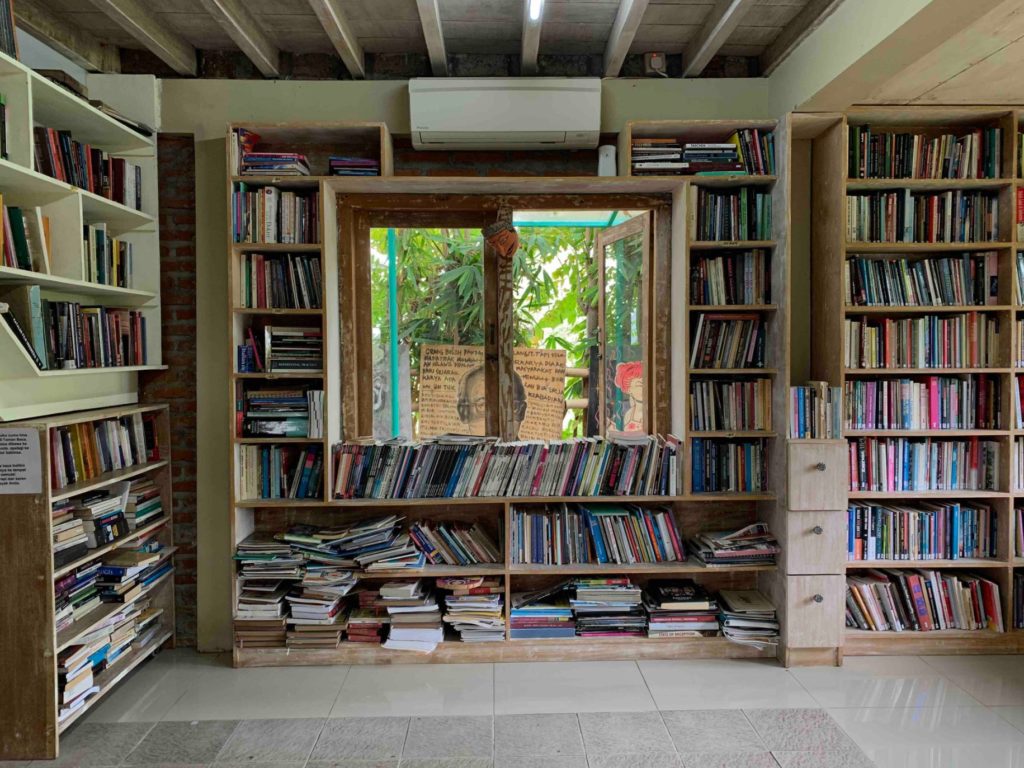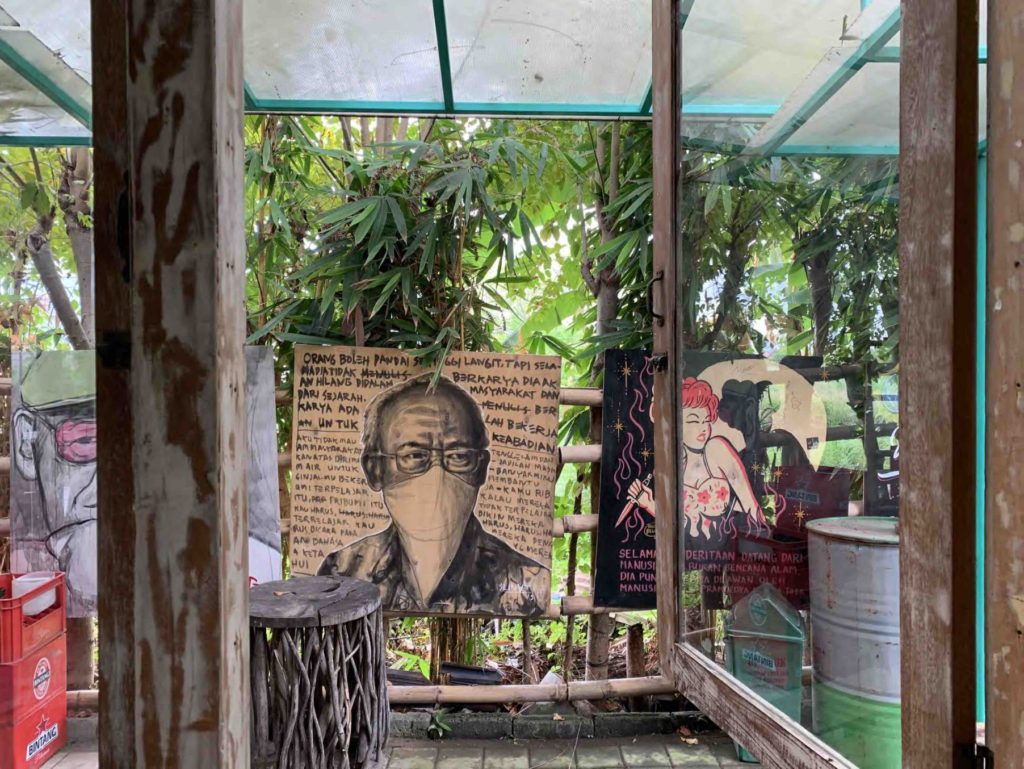Hema was about to leave Bali in a couple of hours, but she had spared a little bit of time before her departure to visit the Taman Baca Kesiman reading room and community space in Denpasar. The 23-year-old, who is from East Kalimantan, said she learned about the ‘reading garden’ from the internet and wanted to check it out for herself.
“There’s no place like this in other cities, or at least they’re really hard to find. I like reading, so I wanted to spare some time to see their collection,” Hema told Coconuts Bali during her visit in July. She said she was impressed with the space’s ambiance and diverse collection of books.
“It’s really cool. It’s very peaceful and far enough away from the bustle of the city. The book collection is also quite varied. It’s such a great place to sit down and read,” Hema said.

Located on Sedap Malam street in east Denpasar, TBK was established by Balinese couple Agung Alit and Hani Duarsa back in 2014. Though it’s situated quite a drive away from Bali’s busiest tourist hotspots, TBK has grown popular among local residents and especially college students.
During our visit to the establishment, there were a number of college students reading in the common space, while others were taking part in a friendly group discussion.
“This is a space to learn. It’s not just about the books, there are other activities such as discussions, performances and other things related to culture. It’s basically a place where you can share, learn, and most importantly, develop critical thought,” Ngurah Carlos, who is a manager at TBK, told Coconuts Bali in a recent interview.
Agung Alit is also the founder of Mitra Bali, an organization that aims to help Balinese craftsmen navigate the cutthroat and sometimes unforgiving world of trade. He’s also one of Coconuts Bali’s badass Balinese history-makers.
TBK has always been independent and was built on land belonging to the family. It houses around 4,000 titles, most of them in Indonesian, that guests are free to read on the spot. While visitors can’t borrow the books to take home, TBK is open every day from 10am to 6pm.

TBK began as a way to share Agung and Hani’s private collection of books with the public, but Carlos said that the founders grew increasingly more concerned with the massive amount of tourists coming to Bali each year, making them more and more convinced that developing a space for critical thought was crucial for those actually living on the island.
The founders, Carlos added, realized that many Balinese did not really benefit from tourism, and they are of the opinion that the industry mostly benefits those from outside of the island.
“We hope that this place can help people to start questioning things … to be independent in thought,” Carlos said.
Independence seems to be a constant theme at TBK. Another example is the permaculture garden at the front of the compound grows different types of vegetables, some of which are used as ingredients in the little kitchen they operate, from which visitors can purchase drinks and snacks.
Promoting diversity and equality, one book at a time
As you are about to enter the building that houses the book collection, it’s hard to miss the statue of Indonesia’s fourth president, Abdurrahman Wahid, more colloquially known as Gus Dur, grinning from ear to ear. The national figure is known for his strong support and advocacy for diversity in the country, something he shares with TBK.
“That’s our motto, bhinneka and setara (diversity and equality): they are important for humanity. It links back to those concerns about the tourism industry, which looks like it’s offering a lot of freedom but is actually very discriminatory in practice,” Carlos said.
Carlos explained that in TBK, it doesn’t matter where you’re from, what your sexual orientation is, what your ethnicity is etc. All people are accepted and treated equally in their space, embodying Indonesia’s founding ideology of Pancasila.
There’s an open space in the back of the compound, which Carlos says people can use to host all kinds of events. Over the years, artists have used it to perform their music while others have held discussions on various topics – from schizophrenia, the Benoa Bay reclamation, to the 1965 mass killings.
In March 2018, for example, TBK hosted the premiere of Sekeping Kenangan (A Fragment of Memory), a documentary featuring amateur recordings of Taman 65 youth community’s meetings with victims of the 1965 mass killings in Bali. (Taman 65 refers to a Bali-based community, members of which include survivors of 1965 who gets together to discuss seeking justice from the government).
The diverse titles in the library even include books that might be considered “leftist” in Indonesia. Anything that can be perceived by authorities as promoting communism or related ideologies are technically illegal under Indonesian law, which in recent years has prompted raids on some bookstores across the country.
“I don’t think any books should be banned because it normalizes fear. People should not be afraid of [knowledge], and if a book is said to be “leftist,” then how would people know if they have never read it?” Carlos said.
He said whether or not one agrees with an idea is another matter, but the source of knowledge and the space to learn what is right or wrong should not be limited.

Visitors to TBK will also notice several paintings of one of Indonesia’s most important authors, Pramoedya Ananta Toer, within TBK’s compound, along with quotes from his novels. The library’s collection features many of Pramoedya’s works, such as Bumi Manusia (This Earth of Mankind), which Carlos said embodied a lot of values about equality.
“There was a time when Agung would ask college students visiting [TBK] whether or not they knew the man in the painting. But many of them could not name him,” Carlos said.
In 2016, a study ranking the reading interest of citizens in countries across the globe ranked Indonesia 60th out of 61 countries.
It seems only natural, then, to consider that spaces like TBK, with its varied book collection and comfortable space, might attract people to be more interested in reading. Even 25-year-old Carlos, who started helping out in TBK in late 2015, said he used to believe that people don’t really read.
“I used to not believe that other people liked to read, because we live in a digital era and people are more interested in short articles, isn’t that what it’s like nowadays? But after I came here every day, [I saw that] there’s always people coming in to read,” Carlos said.



Reader Interactions